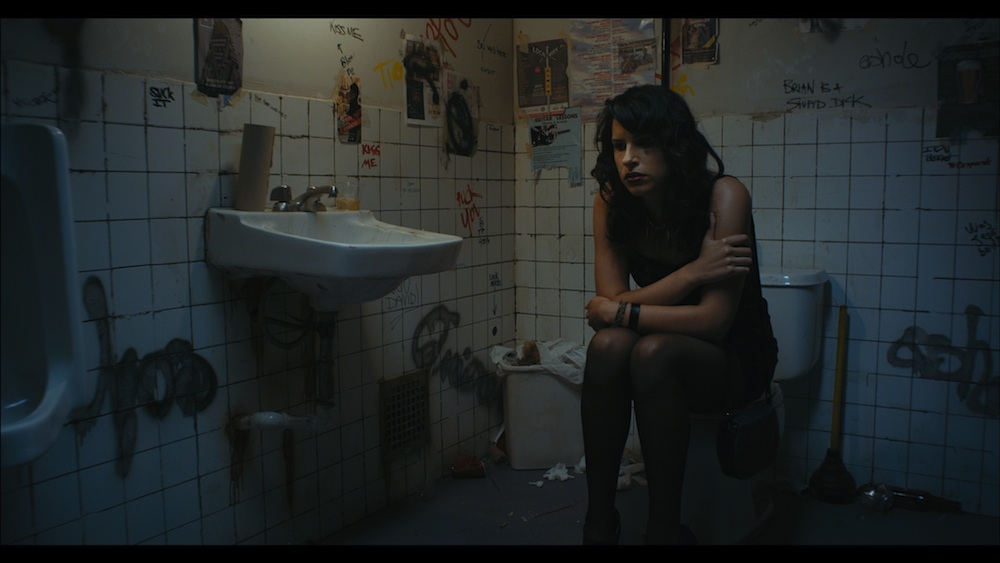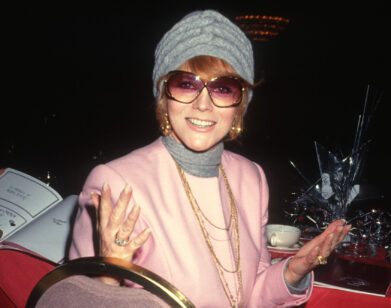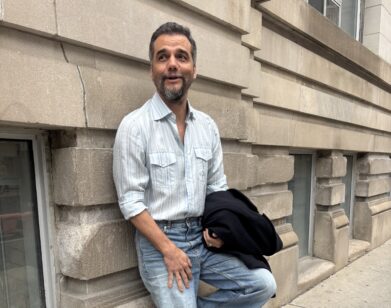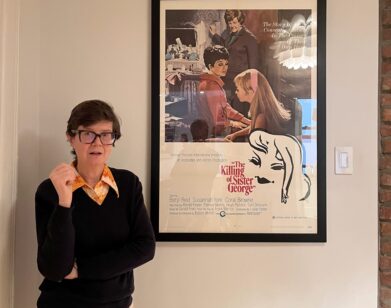Desiree Akhavan on Wesleyan Crackheads and Meaningful Sex Scenes

ABOVE: DESIREE AKHAVAN AS SHIRIN IN APPROPRIATE BEHAVIOR
As soon as Desiree Akhavan showed her first feature-length film at Sundance last week, the Girls comparisons started trickling in. Akhavan, who wrote, directed, and starred in Appropriate Behavior, is quick to shrug them off. “I think it just is what it is,” she demurs. “I have a really specific view of the world, so if I make a film, it’s entirely colored by that.”
Admittedly, it’s easy to see the similarities that inspire those comparisons. Shirin, the film’s protagonist, is a liberal arts grad in Brooklyn who takes odd jobs, attends underwhelming parties, and stumbles awkwardly through sexual encounters and emotional commitments. But there are also enough differences to distinguish her world from Hannah Horvath’s or Frances Ha’s. Shirin, whom Akhavan wrote loosely in her own image, is bisexual, Iranian, and caught in a personal conflict between those two identities (her girlfriend is less than sympathetic towards her closetedness and her parents don’t want to believe she has a closet to come out of). The film is distinctive for its tone, too, in that it doesn’t peddle too much in angst or self-loathing. Akhavan’s gaze on young, creative Brooklyn—if it can ever really be captured from one point of view—is refreshingly kind and good-humored even in its cultural criticism. The divorced dad who reads Vice, the wispy blonde fairy lady named Tibet, the spacey, vaguely occult painter-slash-performance artist: all of these iterations of the no-good hipster are as weirdly likeable as they are laughable.
We met Akhavan at the festival headquarters, where we sat down to talk about her film and the genre of millennial dramas.
ZACK ETHEART: Are you the kind of person who would be comfortable walking down the street toting a strap-on in plain sight?
DESIREE AKHAVAN: Oh, no. [laughs] Not at all. No. I wish I was that comfortable, but no.
ETHEART: So Shirin isn’t just you translated onscreen?
AKHAVAN: I think there are pretty substantial differences, and I think that question that you just asked is a really good example of one in that I could never be that unaware of my surroundings. I think I’m incredibly self-aware to a fault. Shirin is the younger, slightly immature incarnation of some fears I have about myself, but I’d like to think that she was more a look at things I had observed about myself and tried to change after I turned 25.
ETHEART: What are some of those fears?
AKHAVAN: I mean, she’s my heightened best and worst. I wanted her to be separate from me because I don’t think I would be interesting in this narrative specifically. I think that the circumstances of her life are the circumstances of my life, for the most part: Iranian, bisexual, New York, coming out to an Iranian family—yeah, I totally did that. But then there were subtleties and the nuances that I wanted to be much more compelling, and I thought that I should put in a character who had very little self-awareness, but who, on the positive side, was a total risk-taker and a total kid in the best sense of the word—someone who was adventurous and excitable and fell in love completely with everything in a naïve way. And then on the other hand, she’s someone who could be considered bratty, perhaps, or not super-sensitive to other people’s needs. I think of her as a golden retriever, sweet and happy but just knocking shit over while trying to pounce on someone. [laughs] That’s how I thought of her. But the thing we share is our sense of humor. I’m constantly making jokes, and they’re usually completely inappropriate.
ETHEART: I feel like that’s an image of 20-somethings that’s very popular today, that we’re just big children. Do you think you wrote Shirin in that image?
AKHAVAN: I didn’t even notice that, but now that you say it, I can’t argue with you. I think Brooklyn attracts that, for sure. But at the same time, I think I’ll speak for my parents’ generation: My mother was married at 19, and I think she felt a lot of pressure to be an adult as a teenager. She grew up during a war, she was thrown around, and the same thing happened to my father and to all my relatives. I really cherish the luxury that I’ve been born into—the fact that I don’t have to get married right now, the fact that I could pursue whatever ambitious, career-driven goals I have, the fact that I don’t feel like every decision in my life needs to be a reflection of my family. I would like to take care of myself, and that’s an extreme response to my family and the way I was raised. I can’t speak for others, but there is something exciting and liberating about that. I don’t believe in being lazy, but I do think that this “big kid” thing may just be misinterpreting people who are taking advantage of all their opportunities and not tying themselves down to traditional gender roles or traditional life roles.
ETHEART: What do you think goes into the making of a good, honest sex scene?
AKHAVAN: I have really strong feelings about sex scenes in movies. I care a lot about sexuality and how it’s depicted in mainstream media, period, but what I know is movies, and what I find is that they tend to be kind of one-note. Everything is either effortless and sexy and perfect and you’re swept up in the romance, or it’s incredibly awkward and horrible and clunky. I really wanted to communicate something new at every moment, to never just have fucking for the sake of fucking, to subtly communicate power shifts and emotional shifts throughout the encounter. And I also just wanted to show the dynamic changing between the characters in the scene, and being able to pinpoint where that shift happens, from something that everyone’s on board for and excited for to suddenly, something’s changed and no one’s said anything, but it’s happened, so subtly that it’s almost intangible. A really good example of that is Lust, Caution, the Ang Lee film. If you want good sex scenes that communicate a lot, Lust, Caution is a really good place to start.
ETHEART: What you were saying earlier about sex always communicating something—do you think that sex operates that way in real life?
AKHAVAN: I think it communicates something about where you are in your life. Even if you’re just fucking for the sake of fucking, that’s communicating something. I think I don’t need to see it onscreen. Once I get the point, that’s communicating something to me. When I said “fucking for the sake of fucking,” I meant how much screen time you allot it and how much presence you give it.
ETHEART: I guess that’s the line between porn and a meaningful sex scene.
AKHAVAN: Yeah, definitely.
ETHEART: I was wondering about the party scenes. None of them looked especially fun.
AKHAVAN: [laughs] Yeah, well, I love dancing, and sometimes magically a party is perfect and all the elements come together and it’s glorious. But that is such a rare combination, and we are always chasing it.
ETHEART: [laughs] I think a lot of people just give up the hunt.
AKHAVAN: Yeah. Sometimes somebody has an amazing house party and you meet great people and you dance—I’ve had incredible experiences. But they have been so much fewer than the awful experiences where you’re just standing around like, “Why did I come here? We’re all just putting on a show for each other and I might as well be in a museum.” But then there are times like at the Persian New Year party in the film, where Shirin just lets go and has a lot of fun and doesn’t think about how self-conscious she usually is around these people. She takes it for what it is instead of trying shape herself to fit the experience. I don’t know. [laughs] I guess I need to go to more Sundance parties to figure that one out.
ETHEART: I forget her date’s name at that Bushwick party—the one with the chest tattoo.
AKHAVAN: Oh, yes, John Francis.
ETHEART: Yeah, him. That line that Shirin throws at him, “What the hell happened to you at Wesleyan?” Is that something you find yourself asking a lot?
AKHAVAN: Yes, yes. I think some of the smartest and most creative and talented people I know have gone to Wesleyan, but I and many of my friends know people who came out of there and something was different. I mean, there’s a lot of schools—there’s Hampshire, there’s whatever, they’re all the same, but there’s something specifically funny about Wesleyan to me. The girl who plays Crystal in the film, she and I went to high school together—we’re very close friends and she was my inspiration. I wanted to be just like her. She was a playwright and an actress and she went to Wesleyan and I went to Smith and I hated Smith. Every chance I got I would visit her at Wesleyan, so I spent so much time there. And I remember she had a boyfriend who just became a crackhead. [laughs] He just let a family of crackheads move into his dorm room and that was it. What happened to him? I don’t know. He got lost to Wesleyan. But then you see the most talented, incredible innovators in our industry and others coming out of there, too. Some people get lost chasing the cool, but other people own it and make shit happen.
ETHEART: Since the film is vaguely autobiographical, was it difficult not to worry about making Shirin likeable?
AKHAVAN: I tried not to think about it while I was doing it and now it’s biting me in the ass. [laughs]
ETHEART: How so?
AKHAVAN: Well at the time I really pushed myself to just say, “No, fuck everyone else, just do it, just do it.” I was militant about that. And now that it’s being shared with other people it’s really the time to remember, “Fuck other people, fuck other people.” [laughs]
For more from Sundance 2014, click here.






